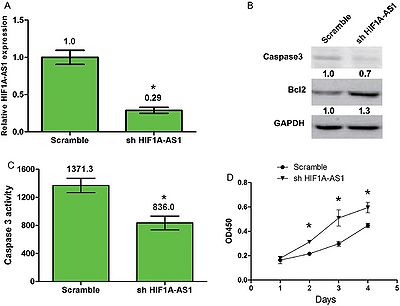Difference between revisions of "HIF1A-AS1"
| (One intermediate revision by one other user not shown) | |||
| Line 4: | Line 4: | ||
===Approved Name=== | ===Approved Name=== | ||
HIF1A antisense RNA 1 | HIF1A antisense RNA 1 | ||
| + | ===Previous Symbols & Names=== | ||
| + | HIF1A antisense RNA 1 (non-protein coding) | ||
===Synonyms=== | ===Synonyms=== | ||
5'aHIF-1A | 5'aHIF-1A | ||
| Line 18: | Line 20: | ||
21897117, 24875884 | 21897117, 24875884 | ||
| − | === | + | ===Characteristics=== |
| − | + | There are two antisense lncRNAs at the 5'(5'aHIF-1A or HIF1A-AS1) and 3'(3'aHIF-1A) ends of the human HIF-1A gene, and they are recovered mainly in the nuclear fractions. <ref name="ref1" /> | |
| − | === | + | ===Function=== |
| − | + | HIF1A-AS1 is activated in response to partially different kinds of stress, such as low oxygen tension and Top1-mediated transcriptional stress | |
and DNA damage.<ref name="ref1" /> | and DNA damage.<ref name="ref1" /> | ||
| − | Suppression of the lncRNA HIF1A-AS1 by siRNA in VSMCs | + | Suppression of the lncRNA HIF1A-AS1 by siRNA in VSMCs will reduce cell apoptosis and promote cell proliferation.<ref name="ref2" /> |
| + | |||
| + | |||
| + | ===Disease=== | ||
| + | kidney cancer | ||
| − | === | + | ===Regulation=== |
| − | + | HIF1A-AS1 expression is up-regulated by 3.26-fold compared with control by BRG1 overexpression, and down-regulated to 0.37-fold by BRG1 silencing.<ref name="ref2" /> | |
| − | |||
===Sequence=== | ===Sequence=== | ||
Latest revision as of 08:32, 20 September 2016
Contents
Annotated Information
Approved Symbol
HIF1A-AS1
Approved Name
HIF1A antisense RNA 1
Previous Symbols & Names
HIF1A antisense RNA 1 (non-protein coding)
Synonyms
5'aHIF-1A
Chromosome
14q23.2

RefSeq ID
NR_047116
OMIM ID
614528
Ensembl ID
ENSG00000258777
pubmed IDs
21897117, 24875884
Characteristics
There are two antisense lncRNAs at the 5'(5'aHIF-1A or HIF1A-AS1) and 3'(3'aHIF-1A) ends of the human HIF-1A gene, and they are recovered mainly in the nuclear fractions. [2]
Function
HIF1A-AS1 is activated in response to partially different kinds of stress, such as low oxygen tension and Top1-mediated transcriptional stress and DNA damage.[2] Suppression of the lncRNA HIF1A-AS1 by siRNA in VSMCs will reduce cell apoptosis and promote cell proliferation.[1]
Disease
kidney cancer
Regulation
HIF1A-AS1 expression is up-regulated by 3.26-fold compared with control by BRG1 overexpression, and down-regulated to 0.37-fold by BRG1 silencing.[1]
Sequence
>gi|537361086|ref|NR_047116.1| Homo sapiens HIF1A antisense RNA 1 (HIF1A-AS1), long non-coding RNA
000081 CGCTGGCTCC CTCCACACGC GGAGAAGAGA AGGAAAGACT ACAGTTCAAC TGTCAATTGG TTGATCACCC GGATTTTATC 000160
000161 TACACCTTAG CCTATGGTTG TTCATCTCGT CTCTGCCTAT GGCCCATTGA CTCCCGGATC CCAGCTCCAT TCTTCGGTAC 000240
000241 TTTACGCACC CTGCTTCCAG TACCCCAACC AGAAGAATAT ATATAGCAGT TAACTGTCAG CTGGCGAAAA GGAGGAAAAT 000320
000321 TCAGGAAGAT AAAATAGCTG AATGAATTAT CCCCGCTCCA GAACGCAGAG GAAAAATGAA ATGGCCAGAC CCAGATGTTA 000400
000401 AAAATGTGTT CCTTGCTCTT TCCTGCCCTA GCAAGGGCTG TTCCATGTTT AGGGGATGAA TGCCGCTGAG AGTATTAGCA 000480
000481 AAAATACATG TGTCATTGAG TCTGAGGAAG ATAACTGAGA CATACAGGTA TTTCTCATAA TGCATGTGGG CATCCATAGA 000560
000561 CATATTCTTA AATGGCTTAA GGACTTGGAA ACTACCTCTA GGAAACCTGA AACTTGAATG TTGGTCCACT AGGGAGAAGA 000640
000641 AATGTTCCAT TA
Labs working on this lncRNA
- Department of Biochemistry “G. Moruzzi”; University of Bologna; Bologna, Italy [2].
- Department of Cardiothoracic Surgery, Changhai Hospital, Second Military Medical University, Shanghai, China .[1]
References
- ↑ 1.0 1.1 1.2 1.3 Shuwei Wang, Xiwu Zhang,Yang Yuan, Mengwei Tan, Le Zhang, Xiang Xue, Yan Yan,Lin Han and Zhiyun Xu."BRG1 expression is increased in thoracic aortic aneurysms and regulates proliferation and apoptosis of vascular smooth muscle cells through the long non-coding RNA HIF1A-AS1 in vitro." European Journal of Cardio-Thoracic Surgery 47 (2015) 439–446.
- ↑ 2.0 2.1 2.2 Bertozzi, D., R. Iurlaro, O. Sordet, J. Marinello, N. Zaffaroni, and G. Capranico. "Characterization of Novel Antisense Hif-1alpha Transcripts in Human Cancers." Cell Cycle 10, no. 18 (2011): 3189-97.